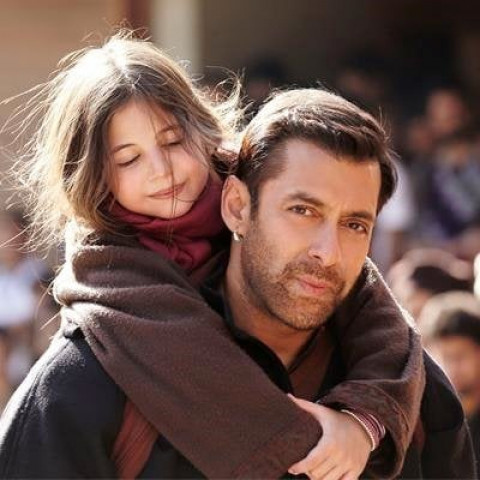Lost in translation
Bajrangi Bhaijaan doesn’t say that we are the same; it just reminds us of our geographical closeness

PHOTO: FACEBOOK
The film tells the story of a good-hearted simpleton, an ardent follower of the Hindu god Hanuman, who crosses over illegally into Pakistan to find the parents of a six-year-old girl, accidentally separated from her mother and left behind in India. The Indian critic thought the film was unreal because, how could an Indian, who doesn’t even hide his identity in Pakistan, illegally cross over and survive? The writer may have a point, but this is commercial Hindi cinema and anyone watching Bollywood knows the fantasy it creates. It is best to say the most difficult things in the simplest possible manner. Bajrangi Bhaijaan is certainly not for the staunch political realists in South Asia, whose nerves are shattered at the very suggestion of options other than that of destruction of the adversary.
The film doesn’t say that we are the same; it just reminds us of our geographical closeness, which, in so many years, has proved to be both a boon and a bane. Pakistan’s best friend is China, but people watch Bollywood movies, not Chinese films. Yet, the bulk in India and Pakistan know so little of each other. We are either a fantasy created by celluloid or an ugly farce, as depicted by angry anchors. In this backdrop, the film simply says that ordinary folk may run into unforeseen problems that require cooperation and defeating of decades-old bureaucratic mindsets. It requires humanism rather than bland and blatant nationalism to treat each other with respect.
Anyone can sit down and make a list of things that appear to be far from reality in the film. The hero, Salman Khan, represents Hindutva, supporters of which, in real life, might want to ban anything Pakistani. Are we not aware of instances where Pakistani artists, shows and exhibitions were stopped by the Hindu right-wing? In this respect, this film is a great experiment in imagination. It humanises the right-wing in both India and Pakistan. Pawan Chaturvedi, the hero of the film, is moved by the helplessness of a child who can’t talk, even after he finds out that she is Muslim and Pakistani. Similarly, after he crosses over, is caught by the Pakistani police and hides in a mosque, the mullah does not shut the door on him. He helps the hero escape.
Film, like literature, is fiction, which by its very nature forces us to imagine possibilities that may not be there in real life. Bajrangi Bhaijaan is not just an India-Pakistan story, it is also about independent yet linked social realities of the two states. It nudges the rabid Hindu right-wing to think beyond its ideological paradigm in how it treats Muslims in India. In the film, Sharat Saxena, who plays Kareena Kapoor’s father, does not rent out rooms to Muslims which is what often happens in Maharashtra, and also increasingly in Delhi. The film thus is a dialogue with Hindu nationalism, prodding it to change its perspective. The heroine of the film, Rasika played by Kareena Kapoor, reminds the hero and jostles her rabidly religious father about the need for looking at a six-year-old, not through the lens of her religion, but through humanism. The child, Shahida played by Harshaali Malhotra, unintentionally reveals her identity by her attraction to non-vegetarian food and going to a shrine to pray as she had seen her mother do the same. But Rasika, whose character is developed as a strong feminist, remains focused on the needs of a child who cannot talk rather than getting distracted by stark ideological differences. The film not only gives Hindutva a humanist makeover, it also reminds the Hindu right-wing that there are other ways it could deal with minorities in India, as well as Pakistan, which in the Hindutva mind symbolises Muslims in India.
I wonder why the aforementioned Indian writer feels we are not similar when there are people like him in Pakistan who were angered by the film and tried to get it banned. The film is extraordinary as it engages Pakistan in a conversation without denigrating any of its critical institutions. Similar to the way it humanises Hindutva, it also gives a human face to Pakistan’s security establishment. Once convinced of the authenticity of Bajrangi Bhai’s mission, the border patrol officer allows him to sneak into Pakistan. Despite being eventually caught and tortured, there are other kind-hearted officers who let him leave. The film challenges Pakistan’s officialdom not to view a human crisis from the lens of power and organisational ego. It draws attention towards the need to respect each other’s religious and cultural norms. While doing so, it does not humiliate ordinary Pakistanis, which is one of the reasons the film was popularly received in Pakistan and is a lesson in good diplomacy. The scene of an innocent child with the most amazing face kissing a Pakistani flag in front of an ardently religious Hindu household may have contributed a tiny bit to restoring the ordinary Pakistanis’ confidence in having dialogue with India. In one respect, it is Hindutva engaging with the idea of Pakistan, not shying away from it. The film defeats stereotypes which is perhaps why the hawks and naysayers on both sides are uncomfortable with this production. At this time of deteriorating security ties, this film is a refreshing human intervention.
Published in The Express Tribune, July 30th, 2015.
Like Opinion & Editorial on Facebook, follow @ETOpEd on Twitter to receive all updates on all our daily pieces.
















COMMENTS
Comments are moderated and generally will be posted if they are on-topic and not abusive.
For more information, please see our Comments FAQ